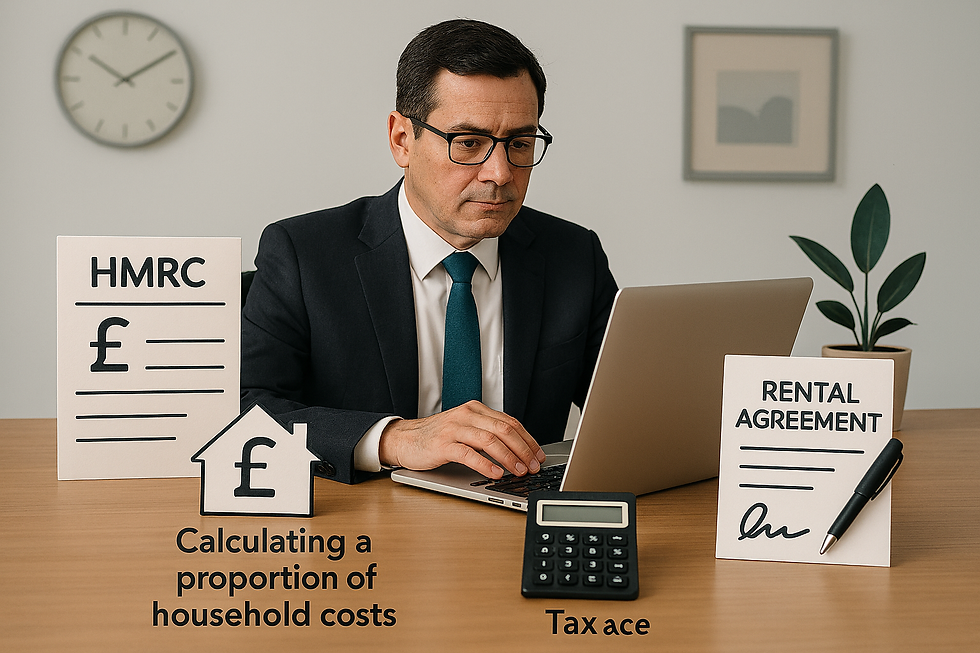The 10 Biggest Tax Mistakes Small Businesses Make (and How to Avoid Them)
- nk2095
- Nov 21, 2025
- 3 min read
Running a small business comes with enough challenges without HMRC knocking on your door. Yet every year we see business owners—smart, hardworking people—losing money or creating unnecessary stress because of avoidable tax mistakes.
At Kala Atkinson, we help UK businesses stay compliant, tax-efficient, and financially confident. Here are the 10 most common tax mistakes we see, and what you can do to stay ahead.

1. Mixing Personal and Business Finances
Using one bank account for everything might feel convenient, but it creates messy records, missed expense claims, and confusion when HMRC wants clarity.
Avoid it:
Open a dedicated business account.
Pay yourself via salary/dividends or drawings, not random transfers.
2. Not Keeping Proper Records
Shoebox accounting is still alive, but HMRC is moving towards Making Tax Digital. Poor bookkeeping leads to inaccurate tax returns, missed VAT claims, and penalties.
Avoid it:
Use cloud accounting (We use Xero and Dext).
Upload receipts the moment you get them.
3. Misunderstanding What Counts as an Allowable Expense
One of the biggest areas of confusion is what HMRC considers an allowable business expense. The test is simple in theory: an expense must be wholly and exclusively for business purposes.
But many owners slip up by claiming items with mixed personal use (HMRC challenges this quickly)
Avoid it:
Ask yourself: Would I incur this cost if I didn’t run the business? If the answer is no (or you can clearly apportion the business element), you’re usually safe. When in doubt, get advice—this is one area HMRC loves to scrutinise.
4. Paying Yourself in a Tax-Inefficient Way
How you take money out of your business can make a huge difference. Many directors overpay tax simply because they’re using the wrong mix of salary and dividends.
Avoid it:Structure your pay properly based on your earnings, personal allowances, and long-term plans.
5. Missing VAT Registration Triggers
Many small businesses sail past the VAT threshold without realising it. HMRC doesn’t accept “I didn’t know” as an excuse.
Avoid it:
Monitor rolling 12-month turnover.
Understand voluntary registration—sometimes it’s beneficial.
6. Not Planning for Tax Bills Throughout the Year
Tax shouldn’t be a surprise. Yet many businesses get caught out at year-end with a bill they didn’t expect.
Avoid it:
Set aside tax monthly.
Forecast liabilities early.
Review profits mid-year with your accountant.
7. Ignoring the Director’s Loan Account (DLA)
Taking too much money out of your company without understanding the DLA rules can create an unexpected tax charge.
Avoid it:
Track what’s withdrawn.
Avoid overdrawn balances.
Get advice before making large transfers.
8. Not Claiming Capital Allowances Properly
Whether it’s laptops, equipment, or even vehicles, capital allowances can significantly reduce your tax. Many business owners either miss them or claim them incorrectly.
Avoid it: Have your accountant review major purchases. It’s usually worth more than you think.
9. Filing Returns Late
Late filing = automatic penalties. Late payment = interest on top. HMRC doesn’t negotiate.
Filing late also raises red flags with HMRC.
Avoid it:
File early, even if you pay later.
Use clear deadlines and automated reminders.
At Kala Atkinson, we aim to get our clients’ accounts done months before the deadline—not days.
10. Not Getting Professional Advice Early Enough
Most tax problems start small and become expensive. Many business owners only seek help once HMRC has sent a letter—or when the business becomes more complex.
Avoid it: Working with an accountant early isn’t a cost; it’s protection and profit. You’ll save more than the fee.
Tax doesn’t have to be stressful. With the right systems, planning, and support, you can stay compliant, reduce your tax bill, and focus on growing your business.
If you want help avoiding these mistakes—or fixing them—we’re here.
Contact us today to see how we can help!




Comments